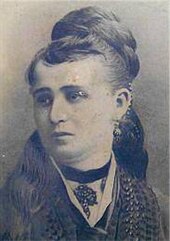Julius Adolf Martin Schuppmann
Julius Adolf Martin Schuppmann (born March 31, 1881 in Berlin-Mitte , Wasserthorstrasse 43; † March 4, 1917 in Berlin, Ackerstr. 41) was a German musician, organist , choir conductor and composer .
Life
Julius Adolf Martin Schuppmann was the son of Helene Margaritta Schuppmann (* December 18, 1848 in Berlin, Adalbertstrasse 27, † August 24, 1887 in Berlin) and married Maria Ernestine Amalie Arlt on August 18, 1902 in Berlin-Mitte.
At the age of 17 he began his studies in Berlin with the Royal Music Director Bernhard Heinrich Irrgang . Schuppmann was enrolled at the previous institution of the Berlin University of the Arts from April 1902 to Easter 1904 for the subject organ , whereby according to the printed annual report his teachers were Otto Becker and Franz Schulz, and graduated from the Royal University of Music in Berlin at the age of 23 . Manuscripts of his organ compositions have been performed several times by his teacher Bernhard Irrgang in his weekly concerts in the Marienkirche in Berlin. Mention as an organist and organ composer can be found in Gotthold Frotscher and in the manual of organ literature by Bruno Weigl .
Surname
The name of his ancestors was originally not spelled "Schuppmann", but " Schuckmann ". His great-great-grandfather was Heinrich Anton Schuckmann in 1757 . In the course of hearing and transcription errors, Schuppmann's name was mutated and his name turned to stone .
Concerts
- December 20, 1905 : J. Schuppmann: Organ concert, organized by Bernhard Irrgang, organ solos by the organizer, J. Schuppmann ("Christvesper").
- On February 7, 1909 , he performed a cantata on the chorale "O, that I had a thousand tongues" in the Church of Reconciliation in Berlin, where he was active as an organist and choir conductor from April 1, 1908.
- 1910 : “But a lot can be expected for the future. In the Nikolai Church , Julius Schuppmann, organist and choir conductor at the Church of Reconciliation, organized a spiritual concert with his choir. While the small choir sang Haydn's “Die Himmel Tell” and “Halleluja” by Handel bravely, the cantata over the chorale: “O, that I had a thousand tongues” (Johann Metzner, 1704) by J. Schuppmann especially in the male voices clearly show shortcomings. "
Compositions
Julius Schuppmann can be found among the composers of organ music in the “Organ Music Repertory”. Title of the work:
- 3 intermezzi for character voices of the organ, opus number: 23.
- Opus 29, 3 interludes for character voices in Eb .
Individual evidence
- ↑ Berlin 6, now 11, birth certificate No. 951/1881 of April 6, 1881.
- ↑ Berlin 6, now 11, death certificate No. 444/1917 of March 5, 1917.
- ↑ Excerpt from the baptismal register of St. Georgenkirche Berlin, year 1849, p. 119, no. 50.
- ^ Standesamt Berlin-Mitte, Berlin 10a, marriage certificate No. 753/1902, from August 18, 1902.
- ↑ a b Musikalisches Wochenblatt , published by EW Fritzsch, 1906, V. 37, p. 244.
- ↑ a b Hofmeister's Handbuch der Musikliteratur, by Carl Friedrich Whistling, 1914, Vol.15, 1914-1918, AZ.
- ^ History of organ playing and organ composition by Gotthold Frotscher, 1935: Schuppmann, Julius on p. 1203.
- ↑ a b Bruno Weigl: Handbook of the organ literature: Complete revision of the guide through the organ literature. Systematically arranged list of solo compositions and instructive works for organ ... / Compiled, provided with critical explanations and information on the degrees of difficulty, ed. by Bernhard Kothe , Theophil Forchhammer , Otto Burkert ; published by FEC Leuckart, 1931, Leipzig.
- ↑ German sound artists and musicians in words and images, published by Friedrich Jansa, 1911, p. 671.
- ↑ Die Musik, edited by Bernhard Schuster, published 1910, p. 128.
- ^ Repertory for organ music, composers-works-editions, 1150-2000, 57 countries, a selection, by Klaus Beckmann, Volume I, 3rd edition, 2001, Schott Musik International, Mainz, p. 282 and index p. 1052.
| personal data | |
|---|---|
| SURNAME | Schuppmann, Julius Adolf Martin |
| BRIEF DESCRIPTION | German organist, choir conductor, composer |
| DATE OF BIRTH | March 31, 1881 |
| PLACE OF BIRTH | Berlin center |
| DATE OF DEATH | March 4, 1917 |
| Place of death | Berlin |

